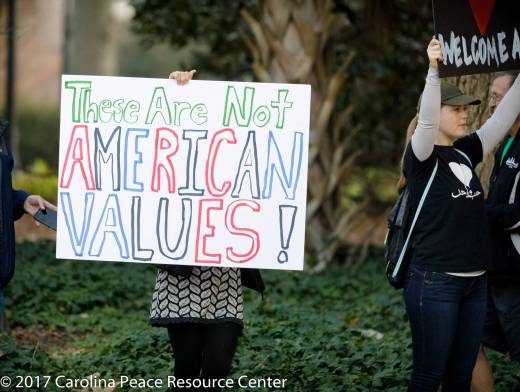A few days ago, in the wake of the passage of the so-called “Muslim Ban,” I was on my way home from a resistance training on protecting the immigrant members of our community. We’d just received confirmation that despite Portland’s status as a “Sanctuary City” for the undocumented and pledges by law enforcement not to assist with nationwide deportation efforts, plainclothes ICE officers have been arresting people at Multnomah County Courthouse this week. Fear of deportation is running at an all-time high, and judges and officials are concerned that the practice will have a chilling effect on defendants, witnesses and victims alike showing up to court. At the training, many of my coworkers were shocked and dismayed to discover that harboring or assisting a so-called “illegal” alien is a federal felony, and that there’s little legal protection for churches that deem themselves sanctuary spaces for refugees, beyond ICE’s past practice.
Lost in thought, I hardly noticed the song playing on my car’s radio at first. “Color In Your Cheeks,” by the Mountain Goats. I surprised myself by bursting into tears as Darnielle sang,
“They came in by the dozens, walking or crawling.
Some were bright-eyed.
Some were dead on their feet.
And they came from Zimbabwe,
or from Soviet Georgia.
East Saint Louis, or from Paris, or they lived across the street.
But they came, and when they’d finally made it here,
It was the least that we could do to make our welcome clear.
Come on in, we haven’t slept for weeks.
Drink some of this, it’ll put color in your cheeks.”
While not an explicitly a resistance anthem, I found myself thinking that the song perfectly encapsulates why people who have never protested or engaged in civil disobedience in their lives are standing up all around us now. Why my mother took the time after her ten hour workday to make a sign and stand with hundreds of others at the capital building in my native South Carolina to protest the immigration ban, in the largest protest I’ve ever seen there.
I think the tears surprised me because despite the gloom hanging over us, the constant inundation with bad news has started to normalize things. Thanks, Mom, for reminding me that This Is Not Normal.

While I hesitate to ascribe any one set of values to those of us living in the United States–especially tied up as our government is (and has always been) in the destructive forces of colonization, globalization, mass incarceration and runaway capitalism–this song helps me think about what it is that makes people in this country feel that Trump’s ban is decidedly “UnAmerican.” It’s true that many of us in this country came from elsewhere, whether directly or 2, 3 or 4 generations back in history. Our ancestors certainly weren’t always treated kindly, whether they were people of color or otherwise. It is important, however, not to erase our fellow Americans in expressing this sentiment. An acquaintance I respect posted on social media the other day, “[s]aying we are a nation of immigrants is anti-Black and anti-Native.”
I believe this notion gets at the root of why the Left has fractured itself in talking about the immigration issues our country faces today. We cannot erase the struggles of our Native and Black brothers and sisters: those who were unwillingly colonized and subjected to genocidal practices. Those who were brought here as property, against their will. It’s hard for me to believe in “American Values” as some shining beacon of hope, jaded as I am by all of my political and historical knowledge of How We Got Here.
But there is something of American tradition–watered down as it may have become–of taking people in. I believe it’s something that originates more in the people of these United States, rather than our government. But lest we forget, the Statute of Liberty’s inscription reads:
“Give me your tired, your poor,
Your huddled masses yearning to breathe free,
The wretched refuse of your teeming shore.
Send these, the homeless, tempest-tost to me,
I lift my lamp beside the golden door!”
Darnielle’s words in the song pick up on this same sentiment–one that I don’t want to forget. I don’t want to forget the hope I am feeling as I listen to the song, as I see my mother’s act of protest: the hope that we will resist, together.
All this being said, I want all of us to remember that Donald Trump has not destroyed democracy. He has merely further weakened something that was barely able to stand on its own under the weight of moneyed interests and white supremacy. If we want to resist this injustice, we’ll have to build a collective vision of a more just alternative–and it certainly doesn’t look like a return to business as usual. So find your own resistance anthems, and talk to each other about what we want our world to look like instead.
